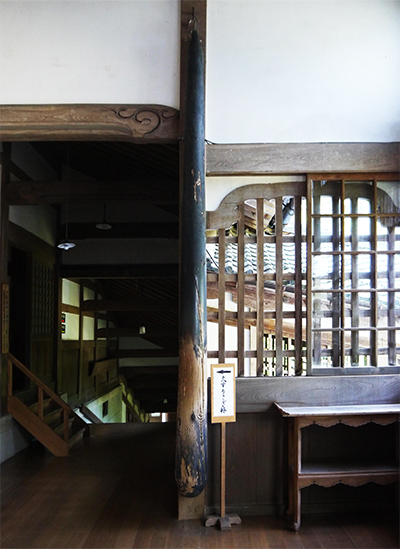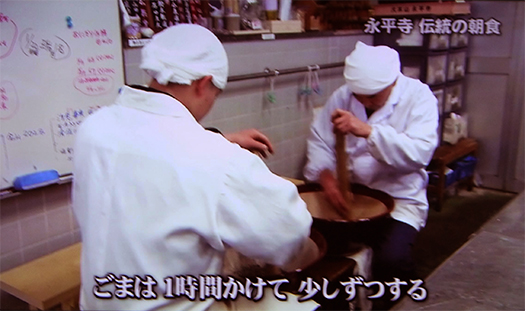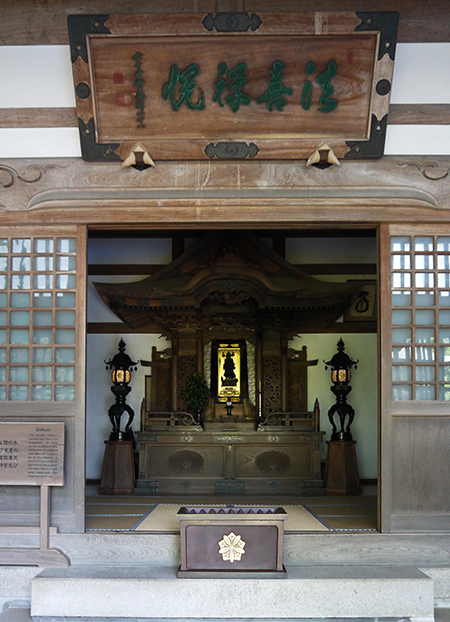


写真は永平寺の庫院にある「大すりこぎ」。
ごま豆腐が肉食を禁じる僧侶のための貴重なタンパク源。
そのありがたさがこのすりこぎに込められているように思われます。
「精進料理」というのは、寺と民人の相互作用の中で育まれてきた食文化だという。
食事の出来具合や心遣いに関する基本姿勢のことであって、ポイントは
食べる相手のことを考えて調理できているか否かということとされる。
・・・なかなか含蓄がある。で以下、道元さんの料理への言葉から。
<精進料理とは? ~曹洞宗の教えから学ぶ~より
https://cuisine-kingdom.com/about-shojinryori/>
<料理を作る篇>
【典座の三心】
禅寺で食事を司る役目を「典座」という、その心得。
1.喜心
他人のためにことを成しその人が苦を離れ楽を得るのを見て己の喜びとする心。
相手の喜びを自己の喜びに食事を作らせていただけることへの感謝を忘れない。
2.老心
いわゆる老婆心。わが身を顧みず深い慈しみから親切になって他者に関わる心。
食べる相手のことを思って調理する。食材そのものにも感謝し丁寧に扱う。
3.大心
山のようにどっしり海のように広々と構え一方に偏ったり固執しない心。
トラブルが起きても広い視野で粛々とことに当たる。
●調理前
・環境をきれいに整える
まな板や鍋、コンロの数、食器などの確認。何がどこにあるか、
どれだけあるか把握する。シンクも調理器具のひとつと捉えきれいにしておけば、
食材がこぼれ落ちても無駄にならない。
●調理中
・洗い物を片付けながら調理を進める
目の前の作業スペースを広く維持しながら調理をすることは心の作業スペースを
広く保つことにも通ずる。
・「やりっぱなし」に注意
ものを出したらしまう、扉を開けたら閉める。「面倒くさい」と感じたことこそ、
すぐ片付けてしまうとよい。雑な自己の在り様と向き合う。
●調理後
・器具はあるべきところに収納する
重いものは下に軽いものは上に。あるべき場所にものを置き安定させることは、
自身の心身の安定にもつながる。 〜引用以上。
いかがでしょうか?
このあと「食べる心得」みたいなことが展開されるのですが、
わたし的にはこの「作る篇」の心得にまことに深く同意する思い。
というのは、「作りながらその先にある『片付ける』を心すべし」みたいな箇所。
実はわたし、自分自身で料理するときに常に心がけている部分。
おお、道元さんも同じ着眼点か、と超ウレシかったのです。
というか、人間として料理に立ち向かうと必ず生起するテーマ。
いろいろな鍋釜、調理器具、火力などを整理整頓統合して
いつなんどき、どんな事象にも対処可能なように「身を整える」ことが
いかに重要な部分であるか、という気付き。
衆生の悲しさ、なかなか完全にはできないけれど心得は理解出来る。
道元さんの生きた時代とは800年以上の時間差があるのですが、
この言葉を読み下すとかれの肉声がはるかにいまを生きていると強く思う。
真言宗徒だけれど、曹洞宗もいいかなぁ(笑)。南無大師遍照金剛。
English version⬇
[Knowledge of making vegetarian food and food Eiheiji-11]
The photo is “Osurikogi” in the warehouse of Eiheiji Temple.
Sesame tofu is a valuable source of protein for monks who forbid carnivorous food.
It seems that the gratitude is put into this pestle.
“Buddhist cuisine” is said to be a food culture that has been nurtured through the interaction between temples and the people.
It is the basic attitude regarding the condition of meals and consideration, and the point is
It is said that whether or not the food can be cooked in consideration of the person to eat.
… There are some implications. So, below, from Mr. Dogen’s words for cooking.
[Three Hearts of Tenzo]
The role of controlling meals at Zen temples is called “Tenzo”.
1. 1. Joy
A heart that makes one’s joy to do something for another and see that person get away from suffering and gain comfort.
Don’t forget to thank the other person for making the meal your own joy.
2. Old heart
The so-called old woman’s heart. A heart to be kind to others from deep mercy without caring for myself.
Cook while thinking about the person you eat. We are grateful for the ingredients themselves and treat them carefully.
3. 3. The heart
A heart that is as spacious as the sea, like a mountain, and does not lean or stick to one side.
Even if a trouble occurs, you can deal with it quietly from a wide field of view.
● Before cooking
・ Clean the environment
Check cutting boards, pots, number of stoves, tableware, etc. Know what is where and how much.
If you treat the sink as one of the cooking utensils and keep it clean, even if the ingredients spill, it will not be wasted.
● Cooking
・ Proceed with cooking while cleaning up the washing
Cooking while maintaining a large work space in front of you is a work space for your heart
It also leads to keeping it wide.
・ Be careful of “keeping going”
If you put something out, open the door and close it. What I felt was “troublesome”
It’s a good idea to get rid of it right away. Face the rough self.
● After cooking
・ Store the equipment where it should be
Heavy ones are on the bottom and light ones are on the top. Putting things in the right place and stabilizing them is
It also leads to the stability of one’s mind and body. ~ More than a quote.
What do you think?
After this, something like “knowledge to eat” will be developed,
Personally, I really deeply agree with the idea of this “making version”.
That’s because it’s a place like “You should keep in mind the’cleanup’beyond that while making it.”
Actually, the part I always keep in mind when cooking myself.
Oh, Dogen-san was also very excited about the same point of view.
Rather, it is a theme that always arises when confronting cooking as a human being.
Organize and integrate various pots, cooking utensils, firepower, etc.
“Getting ready” to deal with any event at any time
Realizing how important it is.
I can understand the sadness of sentient beings, although I can’t quite do it completely.
There is a time difference of more than 800 years from the time when Dogen lived,
When I read this word down, I strongly think that his voice is far more alive now.
I’m a Shingon sect, but I wonder if the Soto sect is also good (laughs). Nanmu Daishi Hensho Kongo.
Posted on 12月 7th, 2021 by 三木 奎吾
Filed under: おとこの料理&食, 住宅マーケティング, 日本社会・文化研究







コメントを投稿
「※誹謗中傷や、悪意のある書き込み、営利目的などのコメントを防ぐために、投稿された全てのコメントは一時的に保留されますのでご了承ください。」
You must be logged in to post a comment.